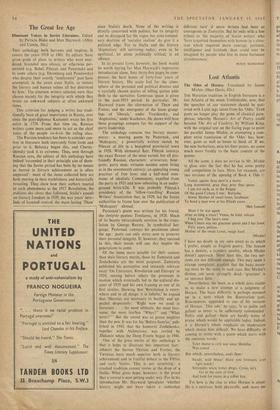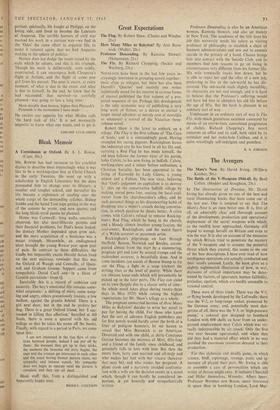Lost Atlantis
THE Horatian tradition in English literature is a lost Atlantis of the mind. Unthinkable, now, that the speeches of our statesmen should be scat- tered with Latin tags taken from his 'Odes.' Even poets no longer play the game of classical para- phrase, whereby Horace's Art of Poetry could become The Art of Cookery, by William King, with the original text on the facing page to point the parallel. James Michie, in attempting a com- plete verse translation of the 'Odes' has, how- ever, gains as well as losses to think of. If we, the new barbarians, miss his finer points, we come much more freshly to the basic content of the poems.
All the same, it does no service to Mr. Michie to gloss over the fact that he has some pretty stiff competition to face. Here, for example, are two versions of the opening of Book 4, Ode i:
Venus, againe thou mov'st a warre
Long intermitted, pray thee, pray thee spare:
I am not such, as in the Reigne Of the good Cynara I was: Refraine,
Sower Mother of sweet loves, forcbeare To bend a man now at his fiftieth yeare . . .
(Ben Jonson)
Must it be war again
After so long a truce? Venus, be kind, refrain I beg you. The time's over
When Cinara was my gracious queen and I her lover.
Fifty years, pitiless Mother of the sweet Loves, weigh hard . . . ( M ichic)
1 have no, doubt in my own mind as to which I prefer, simply as English poetry. The Jonson has a density, a lapidary quality, which Michie doesn't approach. More than this, the two ver- sions are not different enough. This may seem a strange complaint, granted that the basic mean- ing must be the same in each case. But Michie's diction can seem strangely dead--'gracious' is an instance here.
Nevertheless, the book as a whole does enable us to make a new attempt at a judgment of Horace. The basic difficulty is perhaps summed up in a note which the gestoration poet, Roscommon, appended to one of his versions of Horace. 'This ode,' he says, 'is so polite and gallant as never to be sufficiently commended.' Polite and gallant--these are hardly- terms of praise which would be applicable today. Indeed, it is Horace's whole emphasis on moderation which makes him difficult. We have difficulty in coming to terms with a poem which starts with the ominous words: Your theme is civil war since Metellus
Was consul . . .
But which, nevertheless, ends thus:
Steady, wild Muse! Have you for'sworn your light touch?
Simonides wrote better dirges. Come, let's Go to the cave of love And look for music in a jollier key.
Yet here is the clue to what Horace is about. He is a survivor, both physically, and, more im-
portant, spiritually. He fought at Philippi, on the losing side, and lived to become the Laureate of Augustus. The terrible horrors of civil war marked his work in a curious way—we find in the 'Odes' the same effort to organise life, to make it rational again, that we find Augustus making in the sphere of politics.
Horace does not dodge the issues raised by the style which he adopts, and this is his triumph. Though his work is deliberately, even coldly,. constructed, it can encompass both Cleopatra's flight at Actium, and the flight of some new girl from his pursuit. The poet is aware, at every moment, of what is due to the event, and what is due to himself. In the end, he knew that he had succeeded; that survival—so carefully planned—was going to last a long time:
More durable than bronze, higher than Pharaoh's Pyramids is the monument I have made . . .
He excites our appetite for what Michie calls 'the hard tack of life.' It is not necessarily unpoetic to know what one wants, and to get it.
EDWARD LUCIE-SMITH































 Previous page
Previous page